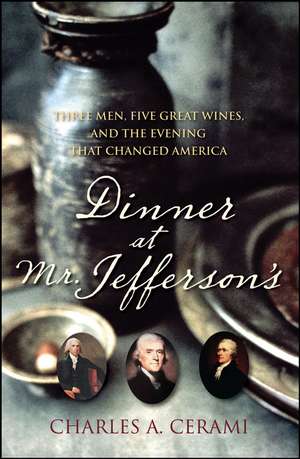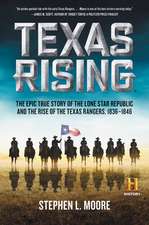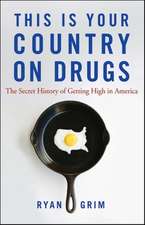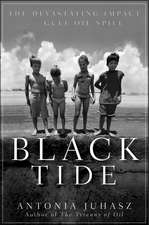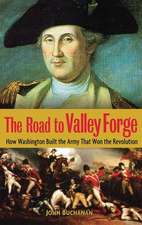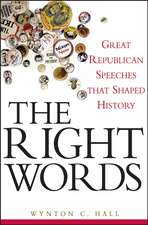Dinner at Mr. Jefferson's: Three Men, Five Great Wines, and the Evening That Changed America
Autor Charles Ceramien Limba Engleză Hardback – 22 mai 2008
Preț: 208.27 lei
Nou
Puncte Express: 312
Preț estimativ în valută:
39.87€ • 43.32$ • 33.51£
39.87€ • 43.32$ • 33.51£
Carte disponibilă
Livrare economică 31 martie-14 aprilie
Preluare comenzi: 021 569.72.76
Specificații
ISBN-13: 9780470083062
ISBN-10: 0470083069
Pagini: 270
Dimensiuni: 165 x 240 x 25 mm
Greutate: 0.54 kg
Editura: Wiley (TP)
Colecția John Wiley &Sons
Locul publicării:Hoboken, United States
ISBN-10: 0470083069
Pagini: 270
Dimensiuni: 165 x 240 x 25 mm
Greutate: 0.54 kg
Editura: Wiley (TP)
Colecția John Wiley &Sons
Locul publicării:Hoboken, United States
Public țintă
US history buffs.Descriere
The Meal That Saved The Republic Only two guests were invited to what was arguably the most elegant, sumptuous, and important dinner party that Thomas Jefferson ever hosted. Each course was prepared and laid out in advance so that no servants would enter the dining room to disrupt conversation and overhear random remarks, which they might later repeat to others. Privacy was imperative. Jefferson believed that the very future of the United States of America depended on convincing Alexander Hamilton to agree to a compromise he and Madison were proposing on two surging issues that threatened to tear the young republic apart.
Plying his guests with fine wine and exquisite cuisine that only a former ambassador to France could provide, Jefferson set the stage for a compromise that enabled the federal government to pay its debts, both domestic and foreign, and make the American dollar "as good as gold."
In Dinner at Mr. Jefferson′s, you′ll discover the little–known story behind this pivotal evening in American history, complete with wine lists, recipes, and wonderful illustrations of 1790s New York, then the nation′s capital. It is a feast not to be missed for lovers of American history, fine dining, and a compelling true story well told.
Plying his guests with fine wine and exquisite cuisine that only a former ambassador to France could provide, Jefferson set the stage for a compromise that enabled the federal government to pay its debts, both domestic and foreign, and make the American dollar "as good as gold."
In Dinner at Mr. Jefferson′s, you′ll discover the little–known story behind this pivotal evening in American history, complete with wine lists, recipes, and wonderful illustrations of 1790s New York, then the nation′s capital. It is a feast not to be missed for lovers of American history, fine dining, and a compelling true story well told.
Textul de pe ultima copertă
The Meal That Saved The Republic Only two guests were invited to what was arguably the most elegant, sumptuous, and important dinner party that Thomas Jefferson ever hosted. Each course was prepared and laid out in advance so that no servants would enter the dining room to disrupt conversation and overhear random remarks, which they might later repeat to others. Privacy was imperative. Jefferson believed that the very future of the United States of America depended on convincing Alexander Hamilton to agree to a compromise he and Madison were proposing on two surging issues that threatened to tear the young republic apart.
Plying his guests with fine wine and exquisite cuisine that only a former ambassador to France could provide, Jefferson set the stage for a compromise that enabled the federal government to pay its debts, both domestic and foreign, and make the American dollar "as good as gold."
In Dinner at Mr. Jefferson′s, you′ll discover the little–known story behind this pivotal evening in American history, complete with wine lists, recipes, and wonderful illustrations of 1790s New York, then the nation′s capital. It is a feast not to be missed for lovers of American history, fine dining, and a compelling true story well told.
Plying his guests with fine wine and exquisite cuisine that only a former ambassador to France could provide, Jefferson set the stage for a compromise that enabled the federal government to pay its debts, both domestic and foreign, and make the American dollar "as good as gold."
In Dinner at Mr. Jefferson′s, you′ll discover the little–known story behind this pivotal evening in American history, complete with wine lists, recipes, and wonderful illustrations of 1790s New York, then the nation′s capital. It is a feast not to be missed for lovers of American history, fine dining, and a compelling true story well told.
Cuprins
Acknowledgments. Introduction.
1 Before the Clash.
2 An Old Friend s Bombshell.
3 The Mounting Anger.
4 The Radical Conservative.
5 Aggressive Lobbying.
6 Thoughts of Breaking Up.
7 Jefferson s Awakening.
8 A Country without a Capital.
9 Doubters and Believers.
10 Nearing a Decision on the Capital.
11 That Day on the Street.
12 Dinner at Secretary Jefferson s.
13 The Philadelphia Story.
14 Doubts Settled, Doubts Revived.
15 Hamilton the Unstoppable?
16 Before the Fall.
17 From Brilliance to Disaster.
18 The Disappearing Cabinet.
19 One Heart and One Mind.
20 The Jefferson Factor.
Appendix A: Recipes from Monticello s Kitchen.
Appendix B: Alexander Hamilton s Letter to New Coast Guard Officers.
Notes.
Bibliography.
Index.
1 Before the Clash.
2 An Old Friend s Bombshell.
3 The Mounting Anger.
4 The Radical Conservative.
5 Aggressive Lobbying.
6 Thoughts of Breaking Up.
7 Jefferson s Awakening.
8 A Country without a Capital.
9 Doubters and Believers.
10 Nearing a Decision on the Capital.
11 That Day on the Street.
12 Dinner at Secretary Jefferson s.
13 The Philadelphia Story.
14 Doubts Settled, Doubts Revived.
15 Hamilton the Unstoppable?
16 Before the Fall.
17 From Brilliance to Disaster.
18 The Disappearing Cabinet.
19 One Heart and One Mind.
20 The Jefferson Factor.
Appendix A: Recipes from Monticello s Kitchen.
Appendix B: Alexander Hamilton s Letter to New Coast Guard Officers.
Notes.
Bibliography.
Index.
Recenzii
"Cerami wittily recounts the evening in rich detail, embracing the culinary details as well as the larger story of President Washington′s quarrelsome cabinet, the evolution of the dual party system, and Jefferson′s emergence as a persuasive national leader." (Library Journal, February 1, 2008) It was 1790, and Thomas Jefferson and one of his dinner guests, James Madison, were determined to work out a political compromise critical to the nation s future with their third dinner companion (and political opponent), Alexander Hamilton. This gathering around Jefferson s celebrated table involved nothing less than the creation of the young nation s finances, foreign relations and the eventual location of its capital. The dinner s results? An agreement that, Congress willing, the new government would assume the states war debts, issue bonds to fund the national debt and make the Potomac s banks the capital s permanent site. Congress agreed. Cerami (Jefferson s Great Gamble) presents a fast–paced narrative of an event well–known but never told so brightly nor at such unnecessary length. While Cerami puts the dinner–table agreement at his story s center, it was but one of a number of seismic events, acts and decisions of the 1790s. Cerami slights many of those when he s not giving us too much detail about other minor ones, such as Jefferson s cooking recipes and a short disquisition (and a long document) on Hamilton s role in the Coast Guard s founding. Compression would have made this inherently fascinating story pack the punch it should. (Feb.) (Publishers Weekly, October 22, 2007)
"presents a fast–paced narrative of an event well–known but never told so brightly." (Publishers Weekly, October 22, 2007)
"presents a fast–paced narrative of an event well–known but never told so brightly." (Publishers Weekly, October 22, 2007)
Notă biografică
Charles A. Cerami is the author of several popular histories, including the New York Times extended bestseller Jefferson′s Great Gamble, Young Patriots, Benjamin Banneker, and ten other books. He was formerly the foreign affairs editor at the Kiplinger Washington Editors, where he oversaw international subjects for the company′s half–dozen weekly publications as well as for Changing Times. His articles have been published in the Atlantic Monthly, Playboy, the New York Times, and Foreign Policy.
